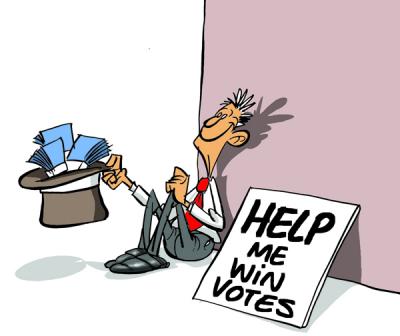Why talks of an impending electoral reform are meaningless in the absence of real attempts to render political financing transparent.
Begging is common in Mauritian Politics. Be it for votes from the electorate or for money from financiers, many of our leaders have plied their trade ensuring that they were cash – and votes – strapped for as long as possible. Any wonder then that the trust of Mauritians in the people representing them at regional and national levels is on the decline and it is certainly not the creation of a bicephalous monster, with a prime minister and a president toying with our collective destinies, that is likely to alleviate this dearth of confidence.
Financial scandals, plundering orgies in parastatals and mismanagement of national resources have reinforced the idea that politics is more about, to paraphrase Blair, skullduggery rather than the pursuit of noble causes. There is a cry of greater transparency that demands to be heard. And it echoes loudest in the political field.
The Supreme Court of the U.S claimed in the seminal case Buckley v. Valeo, 424 U.S. 1 (1976) that “Money is speech” thereby inferring that greater financial power meant greater access to voters through greater message reach. In Mauritius, the situation is different. Communication is afforded to everyone and indeed anyone. The plight is somehow more severe and exists in two main forms, namely the use of political donations to buy political influence and the actual ‘buying’ of voters from the pre-candidacy to the campaign period. The influence of such actions on democracy is nefarious killing its very spirit. As Michael Walzer explains, “Democracy puts a premium on speech, persuasion, rhetorical skill. Ideally the citizen who makes the most persuasive argument – that is, the argument that actually persuades the largest number of citizens – gets his way. But he can’t use force, or pull rank, or distribute money; he must talk about the issues at hand.”
While politicians would seem to be the designated culprits, the burden equally rests on the “roder boute” mentality of voters. The cures to this ongoing sickness warrant no great ‘koz kozer’ sessions but merely political will. Greater reporting requirements, disclosure obligations on donations received as well as spending limitations during the pre-candidacy and campaign periods would help curb the opacity associated with the political game. Another method of ‘insulating the democratic process’ would require the setting of a ceiling on donations to parties with a maximum sum per annum. State funding which has reaped positive results in Scandinavian countries should also be considered with the condition attached that parties would need to ensure that freedom of expression is guaranteed and annual returns submitted with empowered institutions.
In the 1993 legislative elections in France, it was found that three quarters of corporations funding parties were liable to tender for contracts with local authorities. Research on this theme is scant in Mauritius and the extent of the disease not fully known. What is however known is that it can only worsen in the absence of bold measures. Courage is all we need.
Dirty Sexy Money
- Publicité -
EN CONTINU ↻


